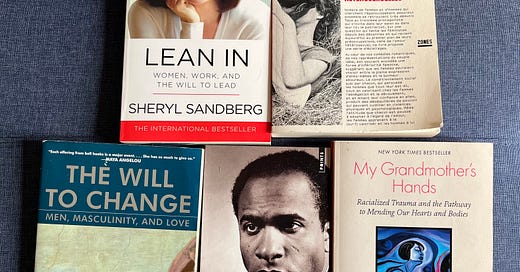I, too, am Sexist and Racist
A Personal Exploration of How Sexist and Racist Biases live in our Collective Unconscious
Claude’s Exploration #4
Last Thursday, I told a friend to his face that I was triggered by the fact that, as we were working on a common project, he had ignored me to talk directly to another man in the group. I expressed that I felt hurt, especially as I am conscious he is a white man, and I am a black woman.
I know there was no conscious intention in him to do wrong. I trust him enough to know he meant it when he said it afterwards.
And it might even be true that the fact I am a black woman wasn’t playing a role in his behavior.
But I truly doubt it.
Because my belief is that we are all sexist and racist, albeit unconsciously. That’s inevitable, owing to the society we live in.
(Nota Bene: I am talking from a French perspective, and I believe it extends to the whole West, but with cultural variations).
For a long time, I was convinced that my being a mixed race woman wasn’t interfering with my career nor my life in general. (I know, I sometimes refer to myself as black, and sometimes as mixed race. That will probably require a whole post on itself, for the time being, you can read my previous post on the topic)
It’s only recently that I realized that I did not see the problem because I had internalized subtle discriminating behaviors as normal.
Reading Sheryl Sandberg’s Lean In was a huge eye opener on the prevalence of unconscious sexist biases in the workplace. At the time I read it, Sheryl was one of the most powerful and respected women in the Tech world, the person that had transformed first Google then facebook into cash machines, no less. I will deliberately not address here the discussion on the societal consequences of the business choices she implemented in those companies, to focus on what she brought to the table on sexism awareness.
The book is very good read, first of all because she shares a lot of her own experience. Each time she was sharing how she was concretely affected by sexism, I felt that you could basically multiply it tenfolds for “normal” women.
But what brings a lot of value, is that the book is packed with results from studies that give a very sound factual base to the arguments.
Here are two of my favorite examples. Sheryl explains how when sitting around a table, women who attempt to talk will get interrupted far more often than men, actually almost systematically. The simple idea that this would happen to someone like Sheryl Sandberg made me shudder, considering her legitimacy and charisma. It actually gives the book its name, as Sheryl urges women to lean in and grab their space around the table, because she feels it won’t be given to them.
The second example is a story I have been using extensively to prove the point of unconscious biases. The board from a great philharmonic orchestra desperately wanted to achieve parity among theirs musicians. But somehow couldn’t make it happen, until they decided to recruit through blind auditions. And all of a sudden, here they were, hiring more women than men.
It so proves the point that people of such good will and commitment to parity are still valuing the musician competence less if they see that the person playing is a woman. It has nothing to do with music, and everything to do with unconscious biases.

With regards to race, I consider unconscious biases to be part of the fabric of our society. France is a country that has built its wealth on the colonization and exploitation of black people for hundreds of years.
We rarely stop to think how much the level of wealth, safety and education we experience in France today is due to the fact that we have been exploiting the resources and people from other continents for centuries, and in many ways still continue to do so.
We can not know this, we can be oblivious of it, it stays nonetheless a historical and economical fact.
I personally benefit from it too, as it allows me today to exist and have the time and resources to be writing this article right now.
In order to function, such a system requires the prevalence of the core belief that black people have less worth than white people, and that in a way, it is normal that they should be exploited. This is nowadays usually not politically correct to say out loud, but it is still very present in the unconscious representation of society that we inherit. It is still conveyed in many more or less subtle ways in our culture.
The famous chocolate powder Banania kept using its slogan “Y’a bon Banania” until 2006, regardless that it conveyed exactly that meaning that black people are happy stupid people that cannot be expected to speak French correctly. Everybody found this perfectly normal, until some people didn’t, and petitioned to have it dismissed.
A friend from Guadeloupe, a black woman, was telling me recently how for her first job she attended a cocktail as a customer guest. She was wearing a black jacket on a white shirt. Her bank account manager that had invited her had never seen her in person, and his first gesture was to ask her to bring him something to drink. He had mistaken her for the waitress. He apologized profusely when realizing the quiproquo.
I am sure that man never thought he was racist. Like most of us, he saw a black woman, and unconsciously categorized her in the serving roles as the most probable scenario. My friend confessed that since this episode, she has been very cautious with choosing her attire for social gatherings.
Truth is, I can see how hose kind of reflexes exist in me too.
I realized that one of the reasons why I spent between 15 and 20 years of my life studying hard and securing myself a good corporate position, was because I needed the financial security and social status that it brings so that I could feel safe in society.
I never wanted to be treated like the black woman that was standing before me in the post office queue 2 weeks ago. She was speaking French with a heavy African accent, and the post attendant pretended he didn’t understand her and couldn’t help her. I could see her bending her head, obviously used to try and avoid aggressive behaviors.
But it did not prevent me last week in a cocktail party to be introduced to a great black woman with tremendous expertise and skills, and notice how I had to make an effort inside me to take as seriously as she deserved.
I am not proud of it, but I also feel the need to be honest, and to own it in me instead of blaming “others”. We are the system, it does not exist outside of us.
I thought about naming this post “Not being Sexist and Racist is Acknowledging we Are.” It didn’t sound efficient as a title, and I let it go. But it is still the key idea I want to convey here.
We can only evolve from sexist and racist unconscious biases when we start seing how they play in our behaviors.
I would also like to share how uncomfortable I feel when raising this topic in public.
Since telling my friend to his face that I felt he had disregarded me because I was a black woman, I have been feeling guilty that I might have hurt his feelings and caused him discomfort.
I am afraid he won’t be my friend anymore.
I am afraid I will be seen as overreacting.
But if I don’t tell him, how can start and see biases at play that he has never endured, being himself a white man ?
In a way, I told him because I respect him, and I think he can hear it.
We need to find a way to address this apparently mundane situations, because dismissing that something happened there is exactly how the system keeps thriving.
Books that helped grow my understanding
Lean In - Sheryl Sandberg
Very well documented, and a great ressource to uncover sexist biases in the work environment.
Comment le patriarcat sabote les relations hétérosexuelles - Mona Chollet
Sorry guys, this one has not been translated yet. Wait for it, it’s a must to understand how internalized sexist biases play in men and women relationship. You can read her previous book instead, “In Defence of Witches: Why women are still on trial”.
The Will to Change - bell hooks
Very powerful, as this book is intended for men, conveying how the patriarchal domination model can only evolve with including men instead of rejecting them.
Black Skin, White Masks - Frantz Fanon
Born is the French West Indies, Fanon was a renowned psychiatrist who first wrote about the alienation of the black man that has internalized white supremacy. He then moved on to becoming an activist and thinker of decolonisation.
My grandmother’s hands - Resmaa Menakem
Indispensable to understand how racialised trauma plays in our lives, whether we are black or white, and how to heal from it. Focused on the US, but still very useful.





I appreciate the layers of openness you are working with in your life and sharing in your writing, Claude. These are delicate topics that we, as the collective, need to dive into even with the discomfort that arises. Thank you for sharing your vulnerability and your reflections. I'm enjoying your newsletters!